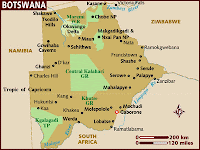
Are compulsory patent licences the answer?
 Writing in Business Daily, Franklin Cudjoe (editor of African Liberty) argues that it is bureaucracy and not drug patents which are the cause of disease in Africa. In discussing the adoption by the World Health Organisation’s governing body, the World Health Assembly (WHA), of a set of public policy recommendations for impoverished governments struggling with disease, he analyses the WHA's call for a more liberal use of compulsory patent licences, enabling governments to produce generic copies of patent-protected drugs on the assumption that patents prevent poor patients from accessing drugs. He then states:
Writing in Business Daily, Franklin Cudjoe (editor of African Liberty) argues that it is bureaucracy and not drug patents which are the cause of disease in Africa. In discussing the adoption by the World Health Organisation’s governing body, the World Health Assembly (WHA), of a set of public policy recommendations for impoverished governments struggling with disease, he analyses the WHA's call for a more liberal use of compulsory patent licences, enabling governments to produce generic copies of patent-protected drugs on the assumption that patents prevent poor patients from accessing drugs. He then states: "But patents aren’t pushing up drug prices, bureaucrats are. Consider the huge tariffs put on imported medicines in the developing world, going as high as 30 per cent in some African countries.He cites the example of the research findings of Africa Fighting Malaria (AFM) that (i) of a representative sample of anti-malarial drugs sold in six African nations, almost half the drugs manufactured in Africa failed basic quality tests and (ii) a third of the drugs sold in Africa were single dose malaria treatments, often ineffective and causing the creation of drug-resistant strains of the disease. The irony, he says, is this:
What’s more, prices aren’t the reason so many poor patients can’t get healthy. Even if you gave them unlimited to access to top-notch pharmaceuticals, most would still be facing substantial health risks every day.
From drinking water from polluted rivers, reliance on defunct medical equipment to living near open sewage systems.
Compulsory licences would likely exacerbate the problem of substandard pharmaceuticals in Third World drug markets. Locally produced pharmaceuticals often don’t meet basic quality and safety standards".
"The WHA is also encouraging Western pharmaceutical firms to increase investment into medicines for diseases unique to the Third World. How do you convince shareholders to invest in R&D when the resulting drug formula can just be stolen by the local government -- with international sanction, no less?"He concludes that the WHA should encourage poor countries to adopt prudent economic policies that will enable investment in healthcare infrastructure and ultimately encourage citizens to buy reliable health insurance.
My feeling is that it is necessary to distinguish the smaller picture from the larger one. In every individual situation in which a person's health is at risk because a patented product is not available to him, compulsory licensing would remove that barrier and provide relief -- but Franklin Cudjoe is right to say that prudent economic policies are the best solution in the long term since they provide the basis for market forces to enable legitimate medicinal products to be sold and distributed affordably while making it worthwhile for the IP owners to police the integrity of their own products.









































